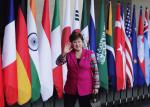The global economy may hit its slowest rate of growth in over 30 years, prompting the International Monetary Fund (IMF) to call for more assistance for low-income countries and members.
"For the weakest members of our global family, additional support from wealthier countries is essential," IMF Managing Director Kristalina Georgieva said in Washington ahead of the group’s annual meeting.
The IMF projected that the global economy may grow only by an average of 3% over the next five years – the weakest rate of growth since 1990, Georgieva said in her speech.
The rate last year hit 3.4% after a brief surge due to the post-lockdown economic boom, but supply chain issues and the war in Ukraine are just two of the many factors that have created significant blocks for a higher rate of sustained growth.
IMF SAYS RISKS TO FINANCIAL STABILITY HAVE INCREASED, CALLS FOR VIGILANCE
Georgieva suggested three actions that advanced economies should prioritize to help boost growth in the coming years, including price stability, structural reforms and fostering solidarity.
Most critically, she suggested accelerating a digital revolution and a "green step change," arguing that moving toward green energy projects will help create new economic opportunities.
Overall, such an effort would take around $1 trillion for renewable energy alone, she projected, stressing that the effort would result in greater growth and jobs to balance out the significant upfront cost.
An IMF report released in January also listed severe health outcomes in China and tighter financing costs that could worsen debt distress as other major trends to watch as analysts look for optimistic signs of growth in the coming years.
IMF AGAINST MAKING CRYPTO LEGAL TENDER, ISSUES ACTION PLAN
The IMF said that China and India account for more than half of current growth, but around 90% of advanced economies could see a decline in growth after central banks raised interest rates to combat soaring inflation.
Georgieva warned that those same stabilizing effects could have a further negative impact on developing nations and low-income countries since those higher interest rates lead to higher borrowing costs.
"Poverty and hunger could further increase, a dangerous trend that was started by the COVID crisis," Georgieva said.
"If that were to change, policymakers would face an even more complicated task, with difficult trade-offs between their inflation and financial stability objectives, and the use of their respective tools," she added.
IMF CHIEF EXPECTS TO KEEP 2023 GLOBAL GROWTH FORECAST STEADY
The IMF has around $650 billion in Special Drawing Rights (SDR) funds with which to help boost member country reserves, but those funds should go toward countries that have "strong economic fundamentals."
Georgieva insisted that the IMF’s role is to provide stability, and that most support for struggling member nations must come from the wealthier countries.
GET FOX BUSINESS ON THE GO BY CLICKING HERE
"I would like to make a double plea on their behalf: help them handle the burden of debt, which was made so much harder by the shocks of the past years; and secondly, help ensure that the IMF continues to be in a position to support them in the years ahead," Georgieva said.


